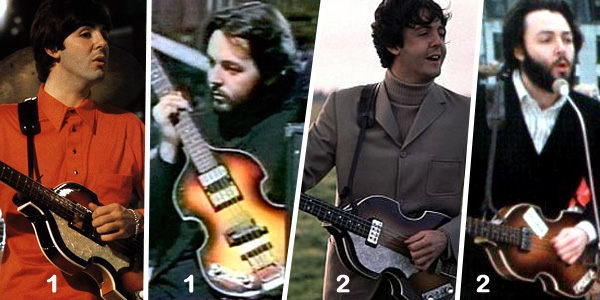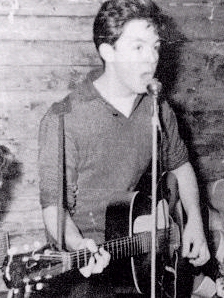reverb.com
Interview: Paul McCartney On His Life as a Bassist | Bacon's Archive
Tony Bacon
Jan 11, 2018

Editor's note: This post is part of a series of unpublished interviews from the personal research archive of noted guitar writer Tony Bacon. These interviews will be appearing on Reverb in the coming months.
Stay tuned for more interviews from Bacon's Archive coming soon. For previous installments, take a look at Tony's interviews with Tom Petty and Chet Atkins, as well as a deeper look into the recording of Sgt. Pepper's.

I met Paul McCartney at his studio for this interview as part of my research for the first edition of The Bass Book. In November 1994, my co-author Barry Moorhouse and I found ourselves motoring a few hours out of London to the converted mill in East Sussex that houses Macca HQ.
There was no doubt where we were: an old map of Liverpool there on the wall, a yellow sticky here on the noticeboard with a note to ring George Martin, a big gold-painted double bass propped in the corner.
Paul walked in, shook hands, and took up the double bass, announcing that Linda had bought it for him as a present and that it used to belong to Elvis Presley’s bassman Bill Black. He then sang two verses of "Heartbreak Hotel" by way of getting acquainted. It was clear this was going to be a particularly enjoyable interview.

You met Elvis, didn’t you?
Elvis was the guy. He ended up a complete plonker, unfortunately—he turned in the end, wanted to become a Federal drug marshal. But I did love him in the early days, and yes, when we met him, that’s the period I remember. I don’t bother when you go into Vegas and the rhinestones and all that—it’s like he didn’t exist from then on for me.

The ‘50s Sun records are great.
Yeah. I heard them this summer—haven’t heard them for years—and I was blown away. I suddenly realized the last time I listened to this thoroughly was before The Beatles, before all that happened to me, and it just stripped it all away. It was like I was a kid playing snooker again and listening. It actually got me crying, pow. Really did it to me. And I could remember all the words, [sings] "Hold me close, hold me tight …" [from "I Want You, I Need You, I Love You"].
Elvis Presley - "I Want You, I Need You, I Love You"
And my kids were like, Dad, you know all the words to this stuff? You better believe it. And I thought, Well, I once was a kid like this, before all The Beatles thing, and now you live with the whole legacy of The Beatles, and it’s great. You could do a lot worse. But you know what I mean? Just the idea of that was fantastic—I was 17 again. Not a bad feeling when you’re 52 [speaking in 1994]. Anyway, what do you want to talk about? I’m nattering on here.

I’d like to talk about you as a bass player, going back as far as we can. I apologize in advance for wanting to go back such a long way…
No, I’m happy to go back, as you just heard. People think, Oh, you’ve had so many questions about The Beatles you must be fed up. I love it. It was a great period of my life. I don’t mind. I’m proud of it. I think what it was, near the breakup of The Beatles, we didn’t want to hear about "Beatles" because it was painful. Now there’s enough time gone. But my bass-playing days go back to when Stuart was the bass player with his big Hofner.
You started out as a guitar player.
Yeah, I did. We all started together when we were kind of kids, early teens—I would have been about 15 or something. My dad bought me a trumpet for one of my birthdays, because a trumpet was kind of a heroic instrument at that time, "The Man With The Golden Arm" and all that. I liked it, and he’d been a trumpet player so he showed me a bit of trumpet.
People think oh, you’ve had so many questions about The Beatles you must be fed up. I love it! It was a great period of my life. I don’t mind. I’m proud of it."
But I realized I couldn’t sing with the trumpet, and I wanted to sing as well, so I asked him if he wouldn’t mind if I traded it in for a guitar. He said fine—he was very understanding—an amateur musician himself. He had a little band called Jim Mac’s in the ‘20s. So I went down and got a Zenith guitar, which I’ve still got around somewhere, quite nice, and I learned on that.

What about your left-handedness?
I realized this when I got the Zenith home, that it was right-handed and I was left-handed. I didn’t know what you did about that—there were no rule books—nobody talked about being left-handed. So I tried it this way and I couldn’t get any rhythm because it was all the wrong hand doing it. And then I saw a picture of Slim Whitman in one of the music papers, and I just noticed, hang on, he’s got the guitar on the wrong way round. Oh. This is OK. And I found out he was left-handed, so I thought, that’s good, you can have it the other way round. Then I changed the strings round.
I never could change the nut—I was not a tech—so I would just change the strings round. The sixth string always had a fat hole, so the first string would have to go into it. We’d chop a little bit of a match off, stick that in there, and that would kind of lift the nut enough. And then you had to hollow out a bit of the nut to get the bass string in, because that kept slipping out.

Paul with his Zenith in 1958
So you did your own technical work [laughs]. High precision [still laughing]—a very do-it-yourself affair. But it eventually worked, and it would hold all the strings, that was the main thing, because if you clouted it, it would just come off.
So that was the first thing. I used to play guitar. Then I met John and George round about the same time. George used to get on the bus. I was one-and-a-half years older than George, so he was the younger guy getting on the bus one stop after my stop. It was probably his haircut or something, I thought well, he’s a bit groovy. He had what we used to call a bit of a Tony Curtis, greased back, you know? So I’d think well, he’s probably all right to talk to.
We got chatting on the bus and he had an interest in guitars like I did, and music. Turned out he was going to try to make one, going to make a little solidbody Hawaiian, which was a good place to start. You didn’t have to get into the hollowbody or anything, which was very difficult. And he did that, and we kind of hung out and became good friends. He did that Hawaiian thing and it wasn’t bad. Real high action, of course.
Meanwhile I’d met John through another friend of mine, and he’d asked me to join The Quarrymen, which was the very first group. So I did that, and I kind of went in first of all as lead guitarist, really, because I wasn’t bad on guitar. And when I wasn’t on stage I was even better. But when I got up on stage at the very first gig I totally blew it. I had never experienced these things called nerves before.



No hay comentarios:
Publicar un comentario